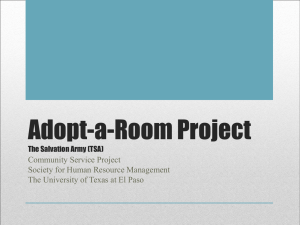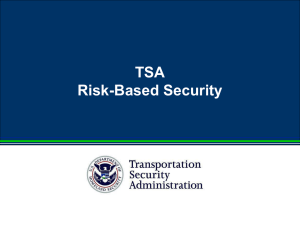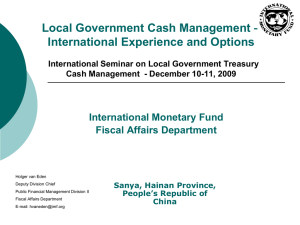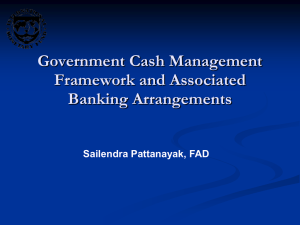RBS External Briefing Deck
advertisement
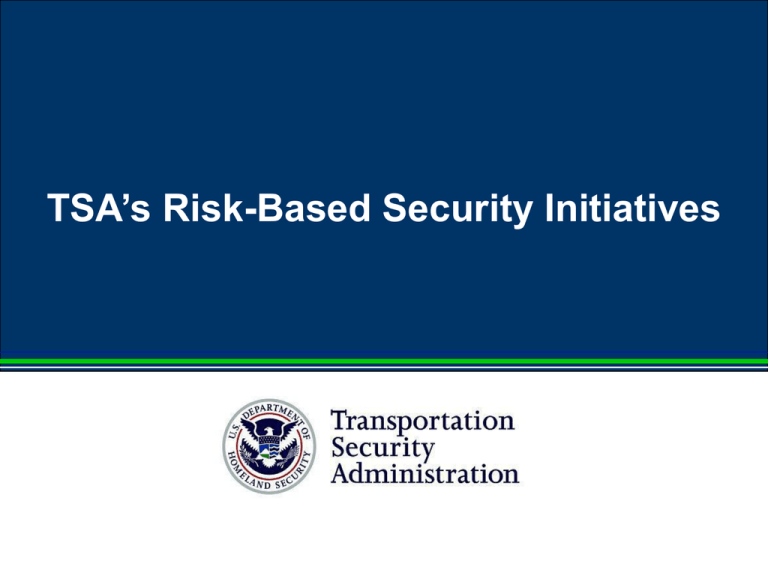
TSA’s Risk-Based Security Initiatives Layered Security Approach TSA uses layers of security as part of a risk-based approach to protecting passengers and our nation’s transportation systems. Multiple layers combine to create a much stronger system. Although checkpoint operations are the most visible layer, they represent just one part of TSA’s security system. Slide 2 Context of a Layered Approach to Aviation Security If TSA can confirm a person’s identity and learn more about them through information they opt to provide, in combination with our other layers of security, physical screening can be expedited for many people. Prescreening; before arriving at the airport Slide 3 Risk-Based Passenger Security Overview TSA is undertaking efforts to provide the most effective security in the most efficient way and improve the passenger experience at airport security checkpoints by applying an intelligence-driven risk-based approach. Guiding Principles of Risk-Based Security 1. The majority of airline passengers are low risk. 2. The more information available on each passenger, the easier it is to assess risk. 3. Behavior detection and interviewing techniques should be strengthened in the screening process. 4. TSA must accelerate its efforts to optimize screening processes and the use of technology to gain system-wide efficiencies. 5. Increase security by focusing on unknowns; expedite known/trusted travelers. Slide 4 Expedited Screening Entry Points There are several ways to receive the expedited screening experience including: • TSA Pre✓™ available at 40 airports, expanding to 100 by end of 2013 • DoD available at 10 airports • CBP Trusted Travelers including Global Entry, SENTRI and NEXUS • Certain frequent flyers • Known Crew Member available at 29 airports • 12 & Under, 75 & Older Slide 5 TSA Pre✓™ Expedited Screening Initiatives TSA Pre✓™ Passengers become eligible for expedited screening to access TSA Pre™ expedited screening lanes through various mechanisms including membership in U.S. Customs and Border Protection Trusted Traveler programs or through partner airlines by meeting TSA established frequent flyer eligibility and opt-in criteria. If TSA determines a passenger is qualified, the low- risk status designation is embedded in the passenger’s boarding pass. By placing more focus on prescreening, TSA is able to expedite physical screening for known passengers while increasing system-wide effectiveness. Over 13 million TSA Pre™ passengers have been screened to date. DoD CAC Card Active Duty Military Members, Reserve and National Guard may receive TSA Pre✓™ screening at 10 airports by presenting their DOD Common Access Card (CAC) card to be scanned. 473, 599 have been screened since November 2011. The program is currently pursuing a list-based DoD solution which does not require a CAC card to be scanned. This will enable active duty military to access TSA Pre✓™ at all 40 airports. Slide 6 TSA Pre™ Application Process The TSA Pre✓™ Application Process will allow pre-approved, low-risk travelers, to experience expedited screening at TSA Pre✓™ airports. The TSA Pre✓™ Application Program will be available in Fall 2013. Fee Based Program - Anticipated to be $85 5 year validity - Similar to CBP Trusted Traveler programs Available to U.S. citizens - U.S. Passport will not be required • Members will be assigned a Known Traveler Number (KTN) • The Application process is a two step process • 1.) Apply online 2.) visit an enrollment center to complete process • The initial two airport enrollment sites will be located at IAD and IND (Fall 2013) • Enrollment sites will be expanded in a phased approach nationwide Icons provide by the nounproject.com Slide 7 TSA Pre™ Passenger Experience at the Airport 1. Access the TSA Pre™ lane (children age 12 and under traveling with a parent or guardian) 2. Present boarding pass and ID to the Travel Document Checker 3. Scan barcode and boarding pass 4. If directed by the Travel Document Checker, proceed through the TSA Pre™ lane where you will receive expedited screening TSA Pre™ Experience Quicker throughput Shorter Lines Shorter wait times Improved customer experience No Divestiture of: Shoes 3-1-1 compliant bag Laptop Light outerwear/jacket Belts TSA will always incorporate random and unpredictable security measures throughout the airport and no individual will be guaranteed expedited screening. Slide 8 TSA Pre™ Airline Participation TSA currently partners with six airlines to provide TSA Pre✓™ by putting the low-risk designation in the barcode of the boarding pass. In addition, Southwest Airlines, Hawaiian and JetBlue are anticipated to participate in TSA Pre✓™ by the end of Calendar Year 2013. Currently, Delta, United, American, US Airways and Hawaiian Airlines provide a TSA Pre✓™ indicator on boarding passes. Additionally, TSA is partnering with additional airlines to update their systems to include printing the TSA Pre✓™ indicator on the face of the boarding pass. Slide 9 Expedited Passenger Screening Experience How it works: Expanded Prescreening Passenger Reservation Airline System Secure Flight • Passengers provide data to TSA Secure Flight through airline systems • Secure Flight conducts watch list matching, analyzes passenger risk and delivers result to airline • Airline places risk designation in boarding pass Real Time Threat Assessment at the airport K-9 Behavior Detection Officer Passenger Risk-Based Physical Screening Travel Document Checker Security Checkpoint • Behavior detection No Divestiture of: • Identity document verification • Shoes • Transportation Security Officer (TSO) directs passenger to screening lane • Laptop • 3-1-1 compliant bag • Light outerwear/jacket • Belts Random and Unpredictable Screening Procedures Slide 10 Other Expedited Screening Initiatives Initiative Known Crew Member Children 12 and under Passenger 75 and older Description and Status (As of August 2013) Initiative pursued jointly by Airlines for America (A4A), Airline Pilots Association (ALPA) and the Transportation Security Administration that allows Flight Deck crew members to enter the sterile airport area through specific designated crew access points using alternate screening procedures. KCM average daily volume is 30,000. Over 8 million have been screened since the program started in August 2011. Currently at 29 airports with expansion plans underway. Modified screening procedures at all airports (not just TSA Pre✓™ airports) for passengers 12 years of age and younger that allows them to keep their shoes on. Since this nationwide initiative started in August 2011, over 45 million children have been screened. Modified screening procedures at all airports (not just TSA Pre✓™ airports) enabling passengers 75 and older to keep shoes and light outer garments on during screening process. Since this nationwide initiative started in March 2012, over 20 million adults 75 and older have been screened. Policy decision to exempt WWII Veterans on chartered Honor Flights from physical screening. WW II Honor Flight Network Nationwide implementation completed in Summer 2011. Since implementation approximately 9,500 Honor Flight passengers have been screened. Slide 11 Social Media TSA monitors social media conversation about TSA Pre ™. The sentiment of the public continues to trend upward and is overwhelmingly positive. What is the public saying about TSA Pre ™? Slide 12 Risk Based Security Initiatives including TSA Pre™ Locations Slide 13 TSA Pre™ Information http://www.tsa.gov/tsa-precheck Slide 14 Federal Security Director Reed L. Roberts Spokane International Airport Eastern Washington District Customer Support/Quality Improvement Manager Patricia Mundy Spokane International Airport | Eastern Washington District Spokane, Pasco, Walla Walla, Pullman, East Wenatchee & Yakima Office : 509.455.3304 | Mobile : 509.998.9258 | patricia.mundy@dhs.gov Office of Public Affairs Lorie Dankers Spokeswoman & Public Affairs Manager Alaska, Idaho, Minnesota, Montana, Nevada, North Dakota, South Dakota, Utah & Washington Office: 206.288.7810 | Mobile: 206.743.1497 | lorie.dankers@dhs.gov Slide 15 Additional Web Connections Transportation Security Administration: www.tsa.gov http://www.tsa.gov/tsa-precheck www.tsa.gov/mobile www.tsa.gov/traveler-information/travelers-disabilities-and-medical-conditions Customs and Border Protection: www.cbp.gov www.globalentry.gov Slide 16 Slide 16 TSA’s Risk-Based Security Initiatives FOR OFFICIAL USE ONLY WARNING: This document is UNCLASSIFIED//FOR OFFICIAL USE ONLY (U//FOUO). It contains information that may be exempt from public release under the Freedom of Information Act (5 U.S.C. 552). It is to be controlled, stored, handled, transmitted, distributed, and disposed of in accordance with DHS policy relating to FOUO information and is not to be released to the public, the media, or other personnel who do not have a valid “need-to-know” without prior approval of an authorized TSA official. No portion of this report should be furnished to the media, either in written or verbal form.
